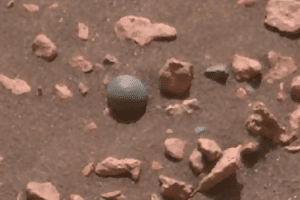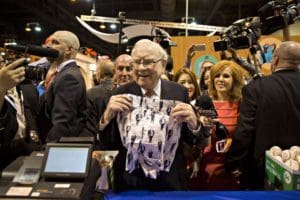 Earlier this week, a camera on board the Mars Curiosity captured a photo of a round, stone-like object. Now, just what that object was, remains to be seen. It all depends on who you ask. NASA deems these strange spheres to be Martian “blueberries,” which applies to many of these round objects. According to NASA, the “peculiar objects are the result of a natural phenomenon called concretion, in which minerals gather and harden inside water-soaked rock. Taking bubble-like shapes, they are more resistant to erosion than the surrounding rock, and when that material erodes away, the odd colored spheres are left behind.” This sounds like a pretty normal explanation; others have a whole different point of view however. The round, stone-like object, according to some, are proof that the object is a cannonball and is a remnant of an ancient Martian war, which eliminated all life from the country. Both are interesting thoughts and I’ll leave it to you which one you believe. And now, on to this week’s logistics news.
Earlier this week, a camera on board the Mars Curiosity captured a photo of a round, stone-like object. Now, just what that object was, remains to be seen. It all depends on who you ask. NASA deems these strange spheres to be Martian “blueberries,” which applies to many of these round objects. According to NASA, the “peculiar objects are the result of a natural phenomenon called concretion, in which minerals gather and harden inside water-soaked rock. Taking bubble-like shapes, they are more resistant to erosion than the surrounding rock, and when that material erodes away, the odd colored spheres are left behind.” This sounds like a pretty normal explanation; others have a whole different point of view however. The round, stone-like object, according to some, are proof that the object is a cannonball and is a remnant of an ancient Martian war, which eliminated all life from the country. Both are interesting thoughts and I’ll leave it to you which one you believe. And now, on to this week’s logistics news.
- Amazon designs self-destructing drones
- UPS warns of delays
- Fruit of the Loom launches subscription model
- China launches world’s first all-electric cargo ship
- Pizza Hut tests booze delivery
- Truck driver shortage continues
 Amazon has been in the news a lot lately, especially considering its emphasis on drone deliveries. Well, considering all the logistics constraints and public concerns of drone deliveries, Amazon made a pretty big announcement. The company revealed plans for a delivery drone that will break apart in case of an in-air emergency. The key part of this is that the parts will fall to “safe spots” such as trees or ponds in case of a mid-air malfunction. After a customer orders an item, and selects “drone delivery,” the Amazon computer systems will immediately look for safe spots to land. This way, if a problem were to arise, Amazon has the mechanism built in to make sure that a “crash landing” occurs in the safest manner possible.
Amazon has been in the news a lot lately, especially considering its emphasis on drone deliveries. Well, considering all the logistics constraints and public concerns of drone deliveries, Amazon made a pretty big announcement. The company revealed plans for a delivery drone that will break apart in case of an in-air emergency. The key part of this is that the parts will fall to “safe spots” such as trees or ponds in case of a mid-air malfunction. After a customer orders an item, and selects “drone delivery,” the Amazon computer systems will immediately look for safe spots to land. This way, if a problem were to arise, Amazon has the mechanism built in to make sure that a “crash landing” occurs in the safest manner possible.
 The e-commerce boom is a good thing, right? Well, I suppose it depends on your responsibilities. UPS is having a difficult time handling the incredible influx of e-commerce orders that it is expected to. The company has added an additional delivery day or two to many online purchases made through their network of retailers. The problem is the fact that more and more consumers are flocking to the Web rather than brick and mortar stores. While UPS has shifted more employees to the e-commerce side of the business, the problem is still in place. The crazy part is that this is not an indication that UPS is incapable of handling the volume; instead it shows the dramatic shift in Holiday shopping (and shipping) as a whole.
The e-commerce boom is a good thing, right? Well, I suppose it depends on your responsibilities. UPS is having a difficult time handling the incredible influx of e-commerce orders that it is expected to. The company has added an additional delivery day or two to many online purchases made through their network of retailers. The problem is the fact that more and more consumers are flocking to the Web rather than brick and mortar stores. While UPS has shifted more employees to the e-commerce side of the business, the problem is still in place. The crazy part is that this is not an indication that UPS is incapable of handling the volume; instead it shows the dramatic shift in Holiday shopping (and shipping) as a whole.
 The subscription-based retail model has shown that it has its ups and downs. One of the most common form, traditionally, (and that means over the last 2 years) has been a recipe delivery program. However, there has been an influx of other types of subscription delivery programs. Most recently, Warren Buffett has launched Fruit of the Loom into the business. The basic premise is that every month, or every desired month depending on the program, Fruit if the Loom will deliver a set of underwear to your house. This model is a very interesting one, considering how many “home delivery” programs exist. However, given the personal nature of this product, it is one that could certainly succeed.
The subscription-based retail model has shown that it has its ups and downs. One of the most common form, traditionally, (and that means over the last 2 years) has been a recipe delivery program. However, there has been an influx of other types of subscription delivery programs. Most recently, Warren Buffett has launched Fruit of the Loom into the business. The basic premise is that every month, or every desired month depending on the program, Fruit if the Loom will deliver a set of underwear to your house. This model is a very interesting one, considering how many “home delivery” programs exist. However, given the personal nature of this product, it is one that could certainly succeed.
There has been plenty of talk here about the current and future state of electric trucks, especially considering the work Elon Musk is putting into Tesla. And, from a supply chain standpoint, this has been the direction most people have wanted to take. However, electric “vehicles” are more than just trucks. China has launched the first all-electric cargo ship. According to China Daily, the 230-foot long vessel is equipped with a 2,400 kWh lithium-ion battery that stores enough electrical energy to transport 2,200 tons of cargo a distance of 50 miles on a single charge at a top speed of about 8 miles per hour. The time to recharge the battery is given as 2 hours, which, coincidentally (?) is the approximate time that is needed to unload the ship at its destination.
![]() What goes better with pizza, than beer? I suppose there are a lot of differing opinions on this matter, but Pizza Hut is going with the aforementioned pairing. The pizza chain announced this week that it will begin testing beer and wine delivery in certain cities. The service will debut in Phoenix, AZ with six-packs of Anheuser-Busch brands, which include the popular and known brands such as Budweiser and Bud Light, as well as some of the lesser known “craft” beer brands the company has bought, including Shock Top and Kilt Lifter. All options will cost a flat $10.99.
What goes better with pizza, than beer? I suppose there are a lot of differing opinions on this matter, but Pizza Hut is going with the aforementioned pairing. The pizza chain announced this week that it will begin testing beer and wine delivery in certain cities. The service will debut in Phoenix, AZ with six-packs of Anheuser-Busch brands, which include the popular and known brands such as Budweiser and Bud Light, as well as some of the lesser known “craft” beer brands the company has bought, including Shock Top and Kilt Lifter. All options will cost a flat $10.99.
And finally, the continuing saga over a truck driver shortage continues to evolve. According to recent research, the American Trucking Associations (ATA) warned that the industry would be short about 50,000 drivers by the end of 2017. And this is a conservative number which could grow significantly over the next five years, depending on who you talk to. There are a variety of reasons why the trucker shortage should not be a lasting issue, but it continues to grow year over year. The key issues revolve around demographics, lifestyle, and the changing nature of trucking as a whole. It will be interesting to see how all of this plays out in the next few years.
That’s all for this week. Enjoy the weekend, and the song of the week, David Bowie’s Life on Mars?
https://www.youtube.com/watch?v=v–IqqusnNQ


















Beer and Pizza deliveries! That is a logistics story that resonates with me.